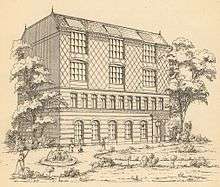Georgina Archer
Georgiana Archer (1827-1882) was a German (originally Scottish) women's rights activist and educator. She played a significant part in the history of women's education in Germany. She is known as the founder of the Victoria-Lyzeum in Berlin (1869). This institution went on to prepare female students for university studies.[1]

Life
Archer was born on 27 September 1827, the daughter of Andrew and Ann Archer. She was born in Edinburgh and was one of four children. Her elder brother, James Archer was a notable artist. When she was fourteen she went to live with two unmarried aunts and she attended a private school.[2] Archer lived in Berlin since the mid-1850s, and worked as an English tutor.
She is the founder of the Victoria-Lyzeum in Berlin which opened in January 1869. Archer had organized teachers, funds to pay them and a board of directors. This was a pioneer institution, but it was launched with modest ambitions so as to not intimidate potential pupils. This was a private venture that was supported by Crown Princess Victoria. The ambition was not to start a university but to provide lectures to women whose education had ceased after they left school. Archer, known as Miss Archer, gave some of the lectures but guests included Friedrich Paulsen, Erich Schmidt and Hugo von Tschudi. By 1875 they had over 900 students taking courses in the history of art, German and French literature, botany, physics, geology, chemistry and pedagogy. Archer had allowed two separate attempts at offering philosophy lectures, but after two teachers were considered unacceptable, the subject was abandoned.[3]
Archer's death occurred on 18 November 1882 in Montreux, where she was trying to recover from overwork.[2] Her role in leading the Lyceum was taken on by Alix von Cotta, who had like Archer been educated in England. She introduced even more advanced courses, and the Lyceum trained many women to teach advanced course at Prussia's 200 public schools for girls.[4]
References
- Lina Morgenstern: Die Frauen des 19. Jahrhunderts, Biographisch u. culturhistorische Zeit- und Charaktergemälde, Dritte Folge. Verlag der Deutschen Hausfrauen-Zeitung, Berlin 1891
- Roderick R. McLean, ‘Archer, Georgina (1827–1882)’, Oxford Dictionary of National Biography, Oxford University Press, 2004 accessed 29 Dec 2016
- James C. Albisetti (14 July 2014). Schooling German Girls and Women. Princeton University Press. pp. 117–120. ISBN 978-1-4008-5979-5.
- Rita McWilliams Tullberg, ‘Cotta, Alix von (1842–1931)’, Oxford Dictionary of National Biography, Oxford University Press, 2004 accessed 29 Dec 2016